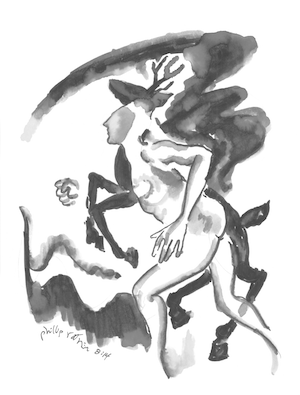B’rach Dodi … Al Haray V’samim
![]()
Hurry my Beloved … to the hills of spices! (Song of Songs 8:14)
Happily ever after? Well, no.

The Song of Songs is our great Love story. As with all great stories, you might wonder, “Well, how does it end?” I grew up with a bedtime story, a myth, a blueprint for how love was supposed to go, where it was supposed to take me, that can be summed up with the words, “And they lived happily ever after.” The last note says, “Ta-da!” “The End.” And I’ve always been a sucker for those romantic comedies that warm my heart and lure me with their fantasies of “happily ever after.”
The Song of Songs ends on such a different note. The lover turns to her beloved in the Garden and says, “Go! Hurry, my Beloved! Flee! Be my gazelle, my young stag on the mountain of spices.”
She turns to Love, Reality, God, the vastness of Being and says, “I will not domesticate you with my concepts; I will not limit you with my convenient definitions; I will not settle for comfort and ease and a small predictable Reality…. because I have glimpsed your vastness, your wild immensity, your unfathomable nature. “
I live at the edge of wilderness, and I’m always playing at that edge. I have a small container garden on my porch, a hummingbird feeder and a seed-block for the woodpeckers, jays, juncos, grosbeaks and finches that I count as family. A grateful tribe of chipmunks live under my wooden planter boxes. Bears sometime lumber onto my porch to do their mischief. The seeds from my chive’s flowers waft off my porch into the ground the surrounds my house, taking root as tufts of delicious food for the deer that wander by.
The other day I stood on my porch and stared into the dark eyes of a doe who was leading her two young children into those between lands where my chives had spread. For a long timeless moment, we were lost in each other’s eyes. And then quite suddenly she must have heard those words, “Hurry, flee, be like a gazelle in your swiftness and wild beauty; run to the mountain of spices.” I was so grateful for those moments and sad to see her go, and happy for her wildness, for in those precious moments, she awakened the wild in me.
And this is also how the Song of Songs ends — leaving us playing at the edge — between our civilized, predictable, constructed, comfort-seeking world… and the vast dangerous mystery that can’t be contained, defined or even fathomed.
The Song of Songs asks, “What would it mean to live at that edge?”
Illustration ©2009 Phillip Ratner, courtesy of the Dennis & Phillip Ratner Museum and the Israel Bible Museum collection. All rights reserved.
To hear the various parts of the chant, use the audio players. To download a chant, right-click the note and save (or download) the linked MP3 file.
To download the PDF file for this chant, click A Wild God PDF. For the musical notation, click A Wild God notation PDF.

